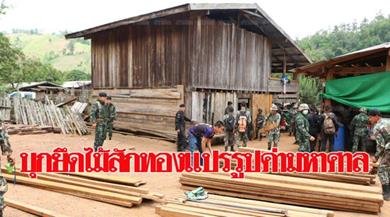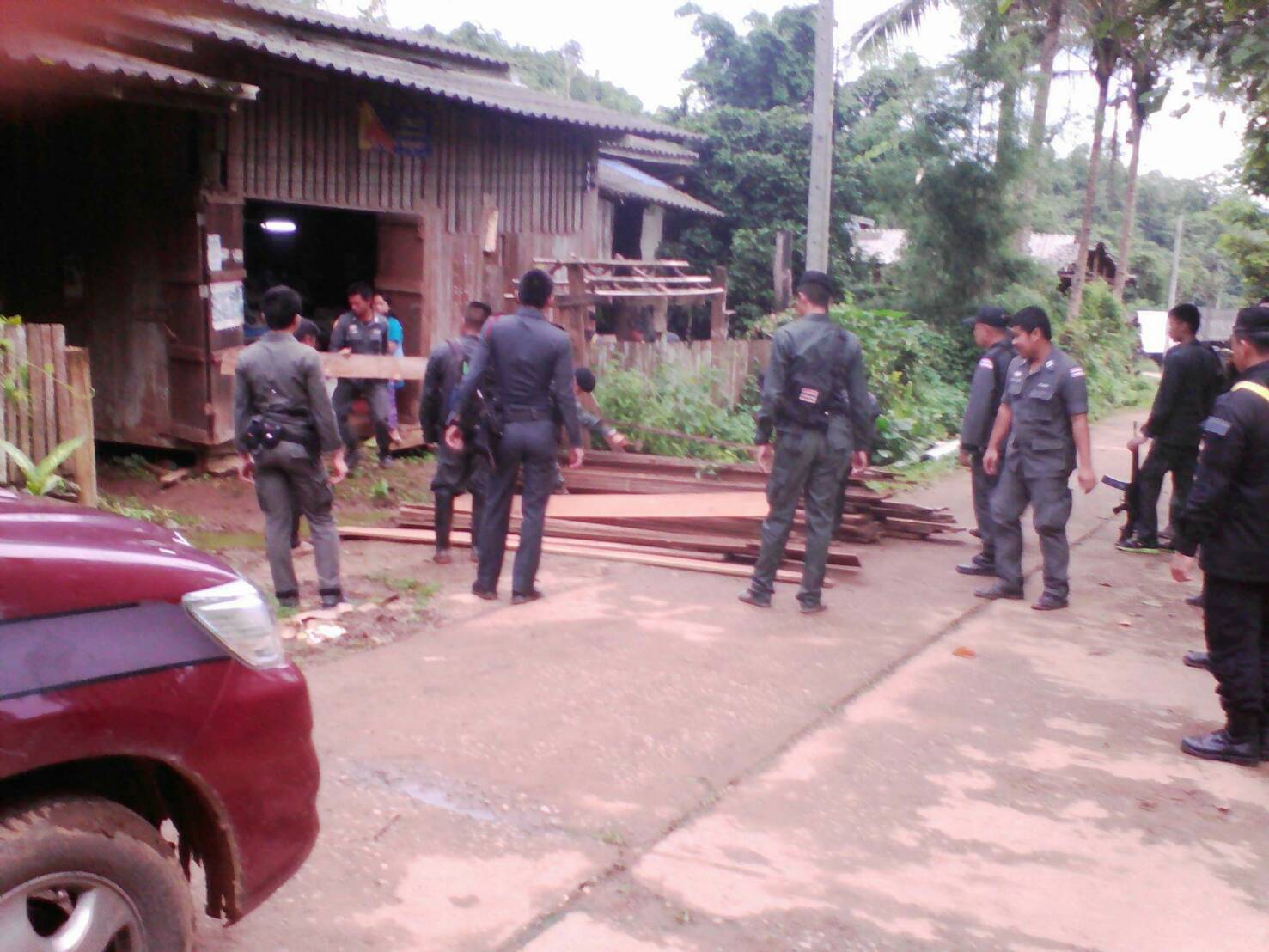Impact on livelihood of ethnic minority in Mae Hong Son province from the national forest law and policy compliance.
 |
Legal Advocacy Center for Indigenous Communities(LACIC) |
Executive Summary.[pdf159KB] |
 |
Laofang Bundidterdsakul | |
 |
||
 |
US$4000 |
Research Background Final Report (abstract) Others

Forcible demolition of miniority's houses.

Confiscating woods from miniority's houses.
Research Background
The Thailand national forest law and policy which led by the junta government
strongly aim for forest protection and deforestation suppression, it also concern in the
national security issue. However, on the north of Thailand especially Mae Hong Son
province are mountainous where inhabited of upland people, various group of native
ethnic minority, who living by shifting cultivation and upland paddy field with out
official land title, and rely on forest resource. When the local authority comply these laws
and policies they almost target to those ethnic minorities community by force land
expropriate and house dismantlement and sued for the criminal charge. Since 2013 until
2016 there were 1347 cases report with out identifying between deforestation and local
livelihood. However, primary examination of the civil society organization in Mae Hong
Son province found that almost affected people are native people who rely on land and
forest for living. Then, it is need to challenge these laws and policies enforcement by
proving strong evidence to show local community's righteousness and its effect to them
by conducting the research. After proving its effect, it need to urge the local authority to
review their operation and consider to stop it.
In term of this research preparation, I gave received an official report of forest law
and policy enforcement of Mae Hong Son province level. My personal is lawyer who have
eleven years experience of land and forest law, moreover I has experience to conduct legal
one research, in academic essay of customary land right case and another one co-research
of ethnic minority right on land and forest. Additionally, I can easily got support field
work and document of this research from other civil society in the target rea.
This research methodology will be define to four main steps, first step is gather
document and identify target group of interviewing, second step is field work for
interviewing, third step is analyzing, and the last step, it is very important activity is
organize the forum among stakeholder, including government agency, affected people,
and civil society, to present the research result and urge resolution. After the research have
done it will be publicized and use for promote ethnic minority right on land and forest of
civil society organization in Thailand.
Finally, I hope that this research will be aware the Thai society about ethnic
minority livelihood and the government will be considered to review and change the
forest law and policy regard upland people rights.
[Sep. 2017]
Final Report (abstract)
To conduct this research, grantee, one researcher and one assistant planned to divide to five periods. First period is document gathering
including law and policy, official report, news and article, and then survey to find affected community, second period is contact person who
can led grantee to visit affect people and community leader including contact province official to ask official document, third period is went
to field work to interview target group, fourth period is information analyzing and research writing, last period is organize a forum for steak
holder.
Some documents found in internet but some could not found, then grantee have to asked from local NGO or the local government, especially
official report. When conducted field work for interviewing most of those targets also sincere to provided information, only some ones avoided to
meet or provide information, however grantee understood well that this is a critical issue, some ones were under risk situation, and some ones
were treated by the officer. Grantee took about five mouths to finish interviewing all targets. After got enough document grantee continued to
examined and analyzed these document, and then wrote a research detail. When finish a first draft grantee have organized a forum to present the
research detail, outcome, and here more comments from participants.
The research have got 4 important findings are
1. The National Council for Peace and Order (NCPO)'s order No. 64/2014 caused significant high amount of affected people, during June 2014 -
September 2017 there were 326 cases per a year, used land were confiscated at least 3,675 hectares which most of them are poor farmer.
2. The government officer, especially military and forest officer often mention that there have some magnates behind local people, such as
hired local gangster or villager to collected wood to sold to them, then this pretext caused they use violence operation or arm force to
charged, searched, enclosed the community to confiscated or dismantled.
3. There are two major impacts to community is confiscated timber for residential building and land used. This term of using is normal living of high land people (ethnic minority).
4. Ethnic minority lack of legal right to land and natural resource using due to the forest protection law and national policy of forest conservation denied to approve, and the NCPO’s order No. 64/2014 is one of the central government mechanism of centralized the forest and natural resource management.
After complete the research, grantee take it to discuss with other two organizations for seeking more opportunities of campaigning. First is the Northern Peasant Federation (NPF), the organization work for land rights advocacy. Second is Manushya Foundation, the organization working to bring community issue approach to the UPR process. Moreover the research detail also published in Thailand website and online journal for three articles.
Grantee’s perspective after the research is under the world trend of environment protection, especially global warming, caused the government impel some policies condemn ethnic minority livelihood and led to many operations to force their land and timber for resident building. To comply with the NCPO’s order No. 64/2014, the central government and officer in the field often claimed that their target is local gangster or the investor who hired villager only, but almost number of affected people is farmer or poor people. The main problem of this issue is forest protection law and national policy of forest conservation which denied high land people rights to land and natural resource. Then to response this problem must consider to push the government for temporary allowing effected people to use land for farming, but for long term resolution must push the government to change forest law land policy.
[Dec. 2018]
Others
